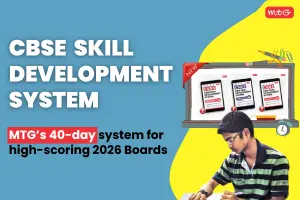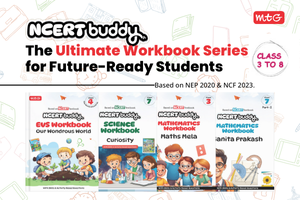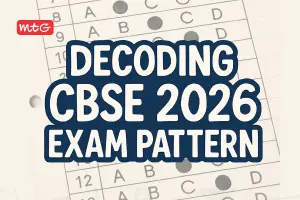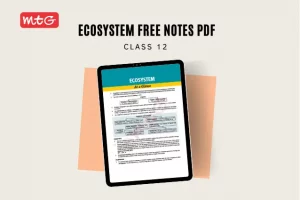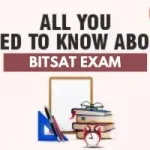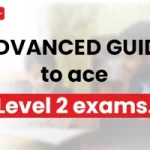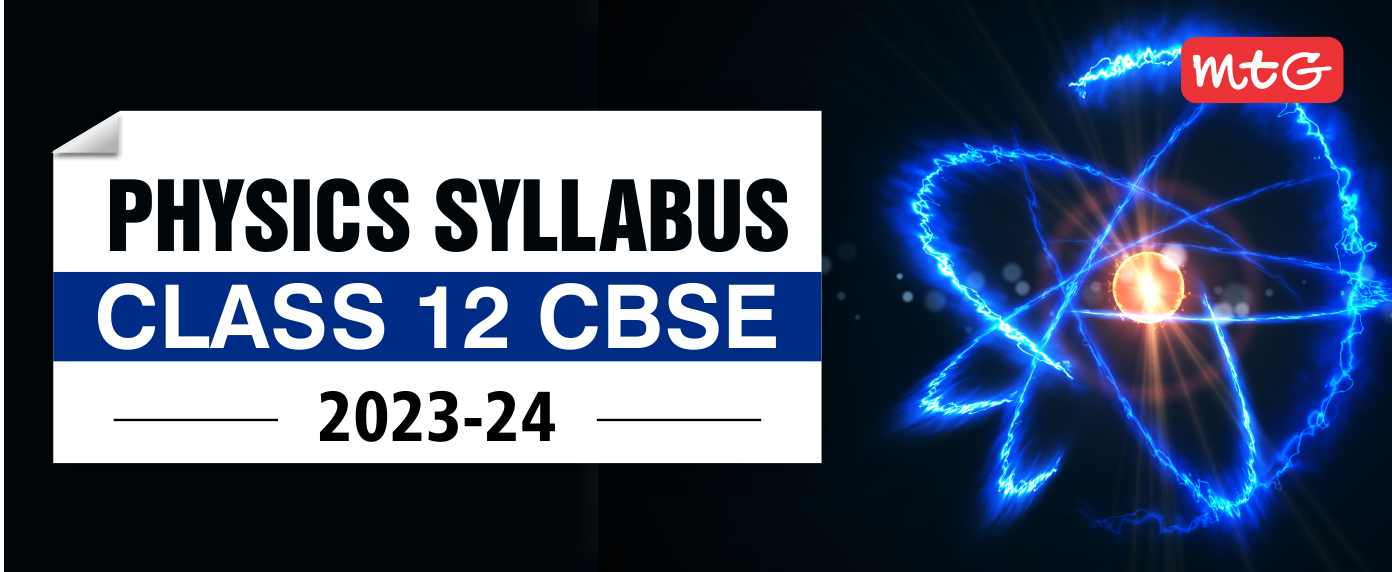
The Central Board of Secondary Education, CBSE, has issued the Class 12 Physics Syllabus 2024–25. Since the new academic year has begun, students should start preparing right away so that they won’t be overwhelmed at the last minute.
This article contains in-depth information about the class 12 CBSE Physics Syllabus that may be used to get ready for the CBSE Board Exam. Additionally, you can make use of the most updated CBSE Class 12 syllabus with CBSE BOOKS like Reference books for class 12, CBSE Books for class 12, CBSE previous year question papers class 12, to ace the biology board exam.
Important – Deleted Syllabus of Class 12 (2023-24) From NCERT Textbooks
Also Check – Deleted Syllabus of Class 12 Physics (2023-24)
Class 12 Physics Syllabus CBSE Board
Students can see the latest released CBSE Class 12 Physics Syllabus 2024-25 below.
| Unit.no | Chapters | Marks |
|---|---|---|
| Unit–I | Electrostatics | 16 |
| Chapter–1: Electric Charges and Fields | ||
| Chapter–2: Electrostatic Potential and Capacitance |
||
| Unit-II | Current Electricity | |
| Chapter–3: Current Electricity | ||
| Unit-III | Magnetic Effects of Current and Magnetism | 17 |
| Chapter–4: Moving Charges and Magnetism | ||
| Chapter–5: Magnetism and Matter | ||
| Unit-IV | Electromagnetic Induction and Alternating Currents |
|
| Chapter–6: Electromagnetic Induction | ||
| Chapter–7: Alternating Current | ||
| Unit–V | Electromagnetic Waves | 18 |
| Chapter–8: Electromagnetic Waves | ||
| Unit–VI | Optics | |
| Chapter–9: Ray Optics and Optical Instruments |
||
| Chapter–10: Wave Optics | ||
| Unit–VII | Dual Nature of Radiation and Matter | 12 |
| Chapter–11: Dual Nature of Radiation and Matter |
||
| Unit–VIII | Atoms and Nuclei | |
| Chapter–12: Atoms | ||
| Chapter–13: Nuclei |
||
| Unit–IX | Electronic Devices | 7 |
| Chapter–14: Semiconductor Electronics: Materials, Devices and Simple Circuits |
||
| Total | 70 |
Unit I: Electrostatics
Chapter–1: Electric Charges and Fields
Electric charges, Conservation of charge, Coulomb’s law-force between two- point charges, forces between multiple charges; superposition principle and continuous charge distribution.
Electric field, electric field due to a point charge, electric field lines, electric dipole, electric field due to a dipole, torque on a dipole in uniform electric field.
Electric flux, statement of Gauss’s theorem and its applications to find field due to infinitely long straight wire, uniformly charged infinite plane sheet and uniformly charged thin spherical shell (field inside and outside).
Chapter–2: Electrostatic Potential and Capacitance
Electric potential, potential difference, electric potential due to a point charge, a dipole and system of charges; equipotential surfaces, electrical potential energy of a system of two-point charges and of electric dipole in an electrostatic field.
Conductors and insulators, free charges and bound charges inside a conductor. Dielectrics and electric polarization, capacitors and capacitance, combination of capacitors in series and in parallel, capacitance of a parallel plate capacitor with and without dielectric medium between the plates, energy stored in a capacitor (no derivation, formulae only).
Unit II: Current Electricity
Chapter–3: Current Electricity
Electric current, flow of electric charges in a metallic conductor, drift velocity, mobility and their relation with electric current; Ohm’s law, V-I characteristics (linear and non-linear), electrical energy and power, electrical resistivity and conductivity, temperature dependence of
resistance, Internal resistance of a cell, potential difference and emf of a cell, combination of cells in series and in parallel, Kirchhoff’s rules, Wheatstone bridge.
Unit III: Magnetic Effects of Current and Magnetism
Chapter–4: Moving Charges and Magnetism
Concept of magnetic field, Oersted’s experiment.
Biot – Savart law and its application to current carrying circular loop.
Ampere’s law and its applications to infinitely long straight wire. Straight solenoid (only qualitative treatment), force on a moving charge in uniform magnetic and electric fields.
Force on a current-carrying conductor in a uniform magnetic field, force between two parallel current-carrying conductors-definition of ampere, torque experienced by a current loop in uniform magnetic field; Current loop as a magnetic dipole and its magnetic dipole moment, moving coil galvanometer- its current sensitivity and conversion to ammeter and voltmeter.
Chapter–5: Magnetism and Matter
Bar magnet, bar magnet as an equivalent solenoid (qualitative treatment only), magnetic field intensity due to a magnetic dipole (bar magnet) along its axis and perpendicular to its axis (qualitative treatment only), torque on a magnetic dipole (bar magnet) in a uniform magnetic field (qualitative treatment only), magnetic field lines.
Magnetic properties of materials- Para-, dia- and ferro – magnetic substances with examples, Magnetization of materials, effect of temperature on magnetic properties.
Unit IV: Electromagnetic Induction and Alternating Currents
Chapter–6: Electromagnetic Induction
Electromagnetic induction; Faraday’s laws, induced EMF and current; Lenz’s Law, Self and mutual induction.
Chapter–7: Alternating Current
Alternating currents, peak and RMS value of alternating current/voltage; reactance and impedance; LCR series circuit (phasors only), resonance, power in AC circuits, power factor, wattless current. AC generator, Transformer.
Unit V: Electromagnetic waves
Chapter–8: Electromagnetic Waves
Basic idea of displacement current, Electromagnetic waves, their characteristics, their transverse nature (qualitative idea only).
Electromagnetic spectrum (radio waves, microwaves, infrared, visible, ultraviolet, X-rays, gamma rays) including elementary facts about their uses.
Unit VI: Optics
Chapter–9: Ray Optics and Optical Instruments
Ray Optics: Reflection of light, spherical mirrors, mirror formula, refraction of light, total internal reflection and optical fibers, refraction at spherical surfaces, lenses, thin lens formula, lens maker’s formula, magnification, power of a lens, combination of thin lenses in contact, refraction of light through a prism.
Optical instruments: Microscopes and astronomical telescopes (reflecting and refracting) and their magnifying powers.
Chapter–10: Wave Optics
Wave optics: Wave front and Huygen’s principle, reflection and refraction of plane wave at a plane surface using wave fronts. Proof of laws of reflection and refraction using Huygen’s principle. Interference, Young’s double slit experiment and expression for fringe width (No derivation final expression only), coherent sources and sustained interference of light, diffraction due to a single slit, width of central maxima (qualitative treatment only).
Unit VII: Dual Nature of Radiation and Matter
Chapter–11: Dual Nature of Radiation and Matter
Dual nature of radiation, Photoelectric effect, Hertz and Lenard’s observations; Einstein’s photoelectric equation-particle nature of light. Experimental study of photoelectric effect
Matter waves-wave nature of particles, de-Broglie relation.
Unit VIII: Atoms and Nuclei
Chapter–12: Atoms
Alpha-particle scattering experiment; Rutherford’s model of atom; Bohr model of hydrogen atom, Expression for radius of nth possible orbit, velocity and energy of electron in nth orbit, hydrogen line spectra (qualitative treatment only).
Chapter–13: Nuclei
Composition and size of nucleus, nuclear force
Mass-energy relation, mass defect; binding energy per nucleon and its variation with mass number; nuclear fission, nuclear fusion.
Unit IX: Electronic Devices
Chapter–14: Semiconductor Electronics: Materials, Devices and Simple Circuits
Energy bands in conductors, semiconductors and insulators (qualitative ideas only) Intrinsic and extrinsic semiconductors- p and n type, p-n junction
Semiconductor diode – I-V characteristics in forward and reverse bias, application of junction diode -diode as a rectifier.
Class 12 Physics Practical Syllabus 2022-23
| Evaluation Scheme | Marks |
|---|---|
| Two experiments one from each section | 7+7 Marks |
| Practical record [experiments and activities] | 5 Marks |
| One activity from any section | 3 Marks |
| Investigatory Project | 3 Marks |
| Viva on experiments, activities and project | 5 Marks |
| Total | 30 marks |
CBSE Class 12 Books – For 2024-25 Board Exams
Excelling in the CBSE Class 12 board exams holds a lot of importance because your good performance in this class will lead to more confidence and high morale in the competitive exams. Taking this into consideration you can’t risk your preparation and depend on some random supplementary book. Trust the tried and tested name by toppers, parents, and academicians – MTG. We offer the most authentic study materials and resources. Our books not only ensure your complete command of NCERT but also a strong foundation for a lot of competitive exams such as Olympiads, NTSE, and other competitive exams. Here are some of those books.
100 Percent Physics, Chemistry, Mathematics, Biology, English – Buy Now
This book is based on the rationalized NCERT and CBSE syllabus. It consists of the complete coverage of the 2024-25 curriculum with theory and practicals. You get concept maps, topic-wise theory, chapter-wise activities, and practice papers for exam preparation. Apart from this, you can also avail thorough self-test assignments, solutions, and varied question types. This book comprises questions based on CBSE cognitive levels to help in your cognitive skills.
MTG NCERT Textbook + Exemplar Problems Solutions for Mathematics and Science – Buy Now
This is the most suitable book if you aim to acquire a good command of MCQ, VSA, SA, and LA in Mathematics and Science subjects. For self-practice, this is the ultimate book. This book helps you grow an analytical approach, helpful for solving problems.
CBSE Champion Chapter-wise Topic-wise 10 Previous Years Solved Papers aka CBSE Champion (Physics, Chemistry, Mathematics, Biology) – Buy Now
For your exam preparation, this book acts as a comprehensive and extensive practice material designed especially for your board exams. Each chapter comes with well-explained important facts, figures, tables, quick recap, theory, flow charts, etc.
CBSE Score More 15 Sample Papers (Physics, Chemistry, Mathematics, Biology) – Buy Now
This book acts as your ultimate success partner and helps you excel in CBSE board exams. It comes with 15 sample papers coupled with the latest CBSE sample question paper based on the latest CBSE pattern, syllabus, and blueprint. Moreover, you also get CBSE additional practice questions. Also, we offer you sample papers with both types of questions – Subjective and Objective. With its self-evaluation sheets, you can assess your exam readiness. (*updated sample paper books will be listed soon)
CBSE Chapter-wise Question Bank – Buy Now
Loaded with never-seen-before features, this book provides theory and CBSE 10 years’ graphical analysis and step-by-step Video Solutions of the detailed 2024 CBSE board exam paper. It comprises the past 10 years’ questions from CBSE, Delhi and All India Papers. It comes with 3 sample papers, 5 practice papers, and solved answers to help you in the CBSE 2025 board exams.
Chapterwise Instant Notes Physics, Chemistry, Biology – Buy Now
To our range of revision books, this book is the latest addition to CBSE board exam preparation. It is renowned as the best revision material for CBSE students as it offers quick chapter-wise notes for the latest CBSE syllabus. It comprises chapter-wise quick recap notes and a multitude of subjective questions that cover the complete chapter in the form of these questions.
Handbook Physics, Chemistry, Mathematics, Biology – Buy Now
As per your requirements, this is the most ideal handbook for quick revisions. Due to its compact, concise, and convenient design, you can revise with the book anywhere and anytime. It comprises notes, formulas, HD images, definitions, terms, and diagrams. These features make the book perfect for last-minute recaps and memorising formulas.
NCERT at your Fingertips for Science and Mathematics – Buy Now
Due to its application-based questions, this book is considered the most trusted resource by toppers, academicians, and parents all over India. It offers a set of exhaustive questions for Science and Mathematics subjects. It covers the latest NCERT textbook syllabus. Moreover, it assists in preparing for CBSE exams, Olympiads, and future competitive exams.
Science Lab Manual Physics, Chemistry, Biology – Buy Now
To excel in your practical exams, MTG’s lab manual is the best resource. It covers a wide range of topics, helping you augment your practical skills and approach the exam more confidently. This manual consists of viva-voce questions, lab experiments, investigatory projects, and NCERT lab manual questions to apprise you of the format and types of questions asked in the exam.
MTG is reputed for staying up-to-date with the latest trends and policies in education. We always make sure to come up with learning material that will help students to ace all the challenges they might face in their educations. You can trust us for 100% error-free and authentic content to achieve your dreams from our CBSE Books for Class 12.
Follow us for all the educational updates!



